|
|
|
Sort Order |
|
|
|
Items / Page
|
|
|
|
|
|
|
| Srl | Item |
| 1 |
ID:
145976


|
|
|
|
|
| Summary/Abstract |
Failure and denial are seductive concepts, and they were explicitly theorised at the Millennium conference in October, 2015. Though used to evoke an array of images to understand the condition of International Relations (IR) as a discipline and in relation to other social sciences, the concepts were not previously deemed pivotal for theorising world events. This article critically assesses how failure and denial are used by IR’s scholarly community as signifiers, and what it is that they signify. To this end, it considers Bruno Latour’s keynote address at the 2015 Millennium conference, along with some of Latour’s shorter works. Drawing on STS (science and technology studies), postcolonial and queer sensibilities, it concludes with a discussion of the significance of theatre in IR scholarship, and examines the broader social and political implications of how we think and understand failure and denial in the era of the Anthropocene.
|
|
|
|
|
|
|
|
|
|
|
|
|
|
|
|
| 2 |
ID:
145985
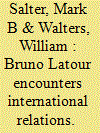

|
|
|
|
|
| Summary/Abstract |
Philosopher and sociologist Bruno Latour’s work on actor-network theory (ANT), science and technology studies (STS), and the politics of nature, has made a substantial impact upon the social sciences, and more recently, International Relations (IR). This interview records Latour’s first direct ‘encounter’ with IR, and explores concepts and topics as varied as sovereignty, the State of Nature, globality and spheres, the thought of Carl Schmitt, war and universalism, Gaia and climate politics, and the creation of publics, secrecy, and politics as a mode of existence. It provides new insight into Latour’s thinking and philosophy, while opening new avenues of research for IR scholars to pursue in the future.
|
|
|
|
|
|
|
|
|
|
|
|
|
|
|
|
| 3 |
ID:
145982


|
|
|
|
|
| Summary/Abstract |
International society, so long the resolution to problems of collective political order, now appears to be failing in its capacity to deal with transnational challenges such as climate change, global security and financial instability. Indeed, the structure of international society itself has become a significant obstacle to such pressing issues of global governance. One striking response has been the reemergence of cities as important actors on the international stage. This article will show how these two issues are intrinsically linked. Cities have taken on new governance roles in the gaps left by hamstrung nation-states, and their contribution to an emerging global governance architecture will be a significant feature of the international relations of the 21st century. But do the new governance activities of cities represent a failure on the part of states, as some scholars have argued? Or are they a part of an emerging form of global order, in which the relationship between states, cities and other actors is being recalibrated? This article argues that the remarkable renaissance of cities in recent decades has been a result of a shift in the structure of international society, and assesses the causal drivers of this shift. It goes on to draw out some of the implications of the recalibration of the relationship between the city and the state for how we understand the emerging form of global order.
|
|
|
|
|
|
|
|
|
|
|
|
|
|
|
|
| 4 |
ID:
145983


|
|
|
|
|
| Summary/Abstract |
The concept of the Anthropocene – the geological epoch defined by human action – has so far remained largely absent from International Relations (IR) analyses. This is perplexing given the monumental stakes involved in dealing with planetary change and the discipline’s overriding focus on crisis. This silence may exist, however, because contemporary studies of international relations are troubled by the Anthropocene, which shifts basic assumptions about how humans live in the midst of perpetual danger, harm, and risk. It also presents us with the prospect of failure in existential terms, if indeed we are living in (and causing) ‘the sixth mass extinction’. The focus of this article, therefore, is threefold. First, to consider the challenges to environmental IR that the Anthropocene concept presents; second, to probe what it means for IR to respond to the end of nature; and third, what is required of IR to deal with the prospect of mass extinction. It is argued that Earth system changes wrought by human action require the discipline to demystify its own ontological, epistemological, and ethical approaches that are culpable in ushering in the Anthropocene. Doing so may allow IR to provide necessary insight into the contemporary and historical effects of the state system as an enabler of planetary change, and the future possibilities for global politics within the Anthropocene.
|
|
|
|
|
|
|
|
|
|
|
|
|
|
|
|
| 5 |
ID:
145977
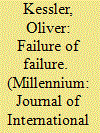

|
|
|
|
|
| Summary/Abstract |
This article explores the relevance of failure for constructivism. Starting from the constructivist focus on ‘language in use’, it conceptualises ‘failure’ as a concept rather than as an observed end or result. Instead of explaining or understanding some empirical failure, the primary questions now become how this concept is being used, and what performative consequences can be observed from this use. As such, the article’s first section develops three ‘uses’ or ‘notions’ of failure: failure as a ‘wrong representation’ of an objectively given reality; failure to produce an inter-subjective understanding that allows actors ‘to go on’; and failure as ‘mode of organisation’ that highlights its discursive grammar, or rules of formation, and the importance of social imaginaries grounding this process. The article’s second section then reconstructs the performance of ‘failure’ in the context of global finance and shows how the market, as a social imaginary, determines questions of authority and expertise. In doing so, this article points to the need for a socio-political economic analysis of economics, and the performance of its concepts, models, and assumptions.
|
|
|
|
|
|
|
|
|
|
|
|
|
|
|
|
| 6 |
ID:
145980


|
|
|
|
|
| Summary/Abstract |
Through the lenses of contemporary terrorism, this article charts the rise of global resentment against the background of the multiplication and denial of failure. The article examines resentment and ressentiment as emotional responses to different kinds of failure: failure of justice and failure of recognition, respectively. It then investigates their place in the affective and moral economy of the global age, teasing out the key distinctions between the two emotions and assessing the strengths of the claim concerning an ever expanding diffusion of ressentiment in late modern times. Through inroads into classical and contemporary political theory, the article seeks to rescue resentment from the relative hegemony of ressentiment. The article closes with a reading of the Paris terror attacks of 7 January 2015 and 13 November 2015, that seeks to disentangle the different forms of resentment mobilised in these acts. By raising the issue of the moral value of resentment, the article ultimately seeks to address the question of how to cope with failure while holding on to emancipatory, counter-hegemonic, and self-affirming political practices.
|
|
|
|
|
|
|
|
|
|
|
|
|
|
|
|
| 7 |
ID:
145978
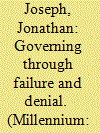

|
|
|
|
|
| Summary/Abstract |
This article sets out a new way of understanding how resilience works as a form of governmentality with specific focus on international interventions. It argues that resilience governs though failure and denial, suggesting that it builds on both failures to govern complex systems and past failures of intervention, in order to promote a new governance through denial that further shifts responsibility onto the governed. It suggests that resilience, rather than being a radical new approach, fits with existing discourse and practices, but offers something new in terms of its approach to knowledge, the social, and the human. Running this through the themes of failure and denial, the article suggests that resilience offers certain possibilities for human action, but that its emancipatory potential is largely constrained by the way it limits how we understand the bigger picture. This is explored in relation to international interventions and the way that resilience contributes to global governmentality.
|
|
|
|
|
|
|
|
|
|
|
|
|
|
|
|
| 8 |
ID:
145979
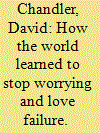

|
|
|
|
|
| Summary/Abstract |
In modernity, failure was the discourse of critique, today, it is increasingly the discourse of power: failure has changed its allegiances. Over the last two decades, failure has been enfolded into discourses of power, facilitating the development of new policy approaches. Foremost among governing approaches that seek to include and to govern through failure is that of resilience. This article seeks to reflect upon how the understanding of failure has become transformed in this process, particularly linking this transformation to the radical appreciation of contingency and of the limits to instrumental cause-and-effect approaches to rule. Whereas modernity was shaped by a contestation over failure as an epistemological boundary, under conditions of contingency and complexity there appears to be a new consensus on failure as an ontological necessity. This problematic ‘ontological turn’ is illustrated using examples of changing approaches to risks, especially anthropogenic understandings of environmental threats, formerly seen as ‘natural’.
|
|
|
|
|
|
|
|
|
|
|
|
|
|
|
|
| 9 |
ID:
145975
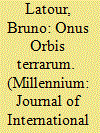

|
|
|
|
|
| Summary/Abstract |
Starting with an insight from Peter Sloterdijk about the enduring notion of Empire in the European idea of sovereignty, this article explores a problem common to the discipline of International Relations, and more generally, geopolitics as well as social theory: the very origin of the notion of an entity endowed with some sort of autonomy over a territory. It is argued that the notion of a bounded entity triggers many artifacts that explains, in part, the failure and denial of world politics, especially over the question of climate change.
|
|
|
|
|
|
|
|
|
|
|
|
|
|
|
|
| 10 |
ID:
145984


|
|
|
|
|
| Summary/Abstract |
Planet Politics is about rewriting and rethinking International Relations as a set of practices, both intellectual and organisational. We use the polemical and rhetorical format of the political manifesto to open a space for inter-disciplinary growth and debate, and for thinking about legal and institutional reform. We hope to begin a dialogue about both the limits of IR, and of its possibilities for forming alliances and fostering interdisciplinarity that can draw upon climate science, the environmental humanities, and progressive international law to respond to changes wrought by the Anthropocene and a changing climate.
|
|
|
|
|
|
|
|
|
|
|
|
|
|
|
|
| 11 |
ID:
145981
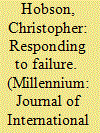

|
|
|
|
|
| Summary/Abstract |
During its first decade in existence, the Responsibility to Protect (R2P) doctrine has struggled to transcend the complexities that plague humanitarian action. This article examines the political challenges that shape the practice of R2P, as well as the discourse that informs it. It reflects on the constant presence of failure that haunts humanitarian intervention, and argues for a more humble stance on what is possible in such situations. Humility entails meditating on human limits, both physical and mental, which serves as an important guide in determining action. It promotes a more chastened position; one that acknowledges that right intentions might not lead to just outcomes, that there are real limits on the ability of external actors to understand or control events during and following an intervention, and that our ability to comprehend such complex situations should warn against premature judgements and confident conclusions. And when failure occurs, it means not denying or avoiding it, but facing it squarely and reckoning with the consequences. The value of adopting a more humble approach will be considered through examining the 2011 Libyan intervention, a significant case for the R2P doctrine. There, success appears to have been exchanged for failure, leaving challenging and unresolved questions about what this experience means for Libya and R2P.
|
|
|
|
|
|
|
|
|
|
|
|
|
|
|
|
|
|
|
|
|